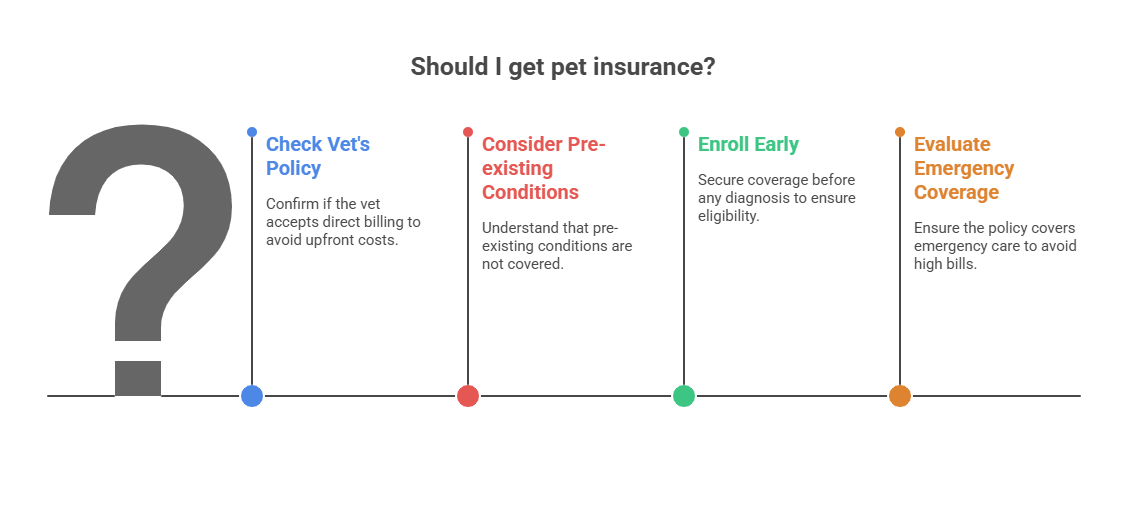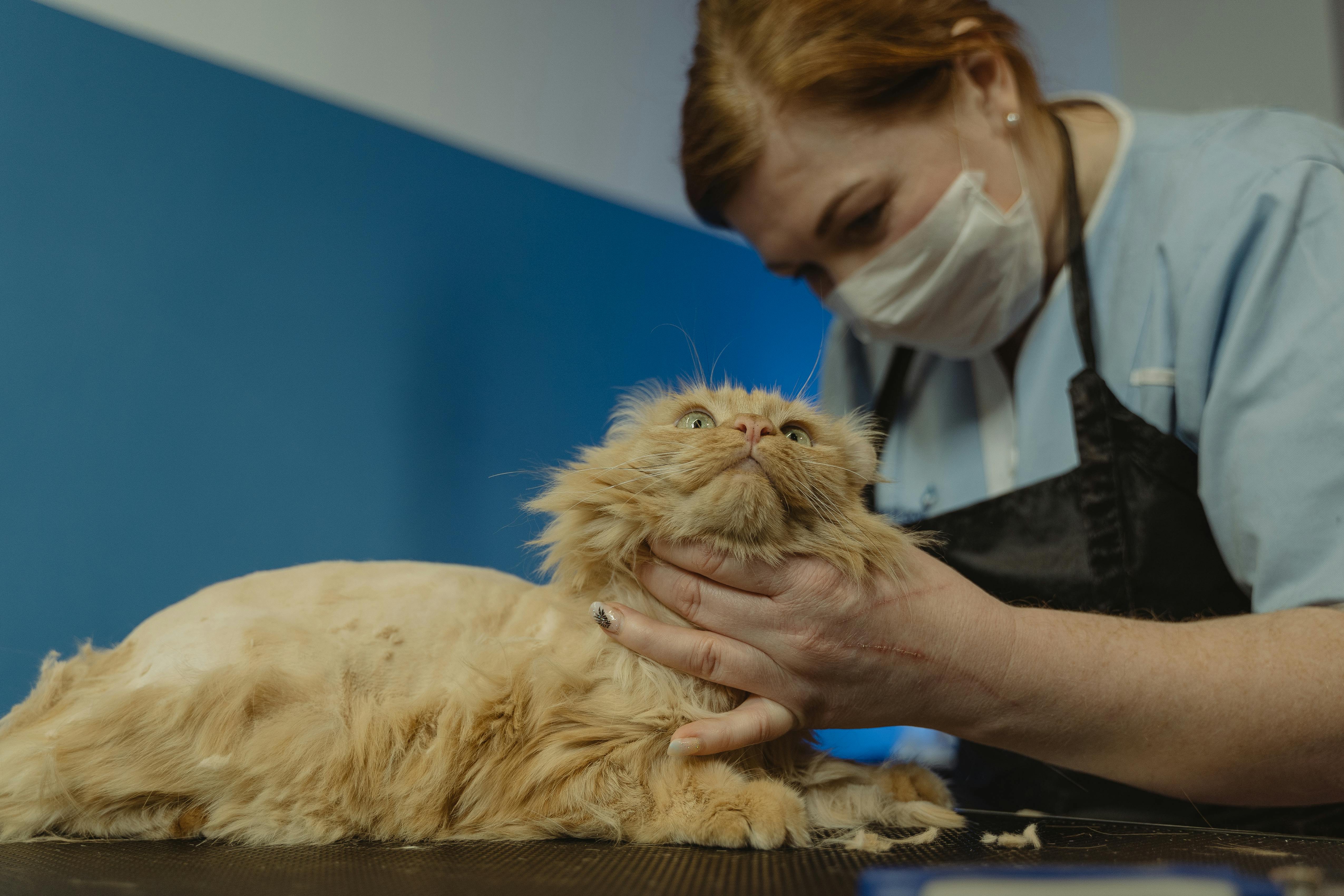Picture this: your dog swallows a sock at midnight, or your cat suddenly can’t breathe. You rush to the vet only to face a $2,000+ emergency bill. You remember you bought pet insurance, but then the clinic says, “Sorry, we don’t process that insurance here.”
Picture this: your dog swallows a sock at midnight, or your cat suddenly can’t breathe. You rush to the vet only to face a $2,000+ emergency bill. You remember you bought pet insurance, but then the clinic says, “Sorry, we don’t process that insurance here.”
This is the reality for many pet parents. Pet insurance is supposed to be a lifeline, but confusion around whether all vets take pet insurance can leave families stressed and blindsided.
At PetCoverage.ai, our mission is simple: remove the guesswork. We help pet parents compare policies side by side, review what’s actually covered, and even flag red flags before you’re stuck with a surprise bill. Our free Pet Insurance Calculator lets you see how much coverage actually saves in good and bad years, so you’re never left unprepared.
Now let’s dive in and answer the big question: Do all vets take pet insurance?
Do All Vets Take Pet Insurance? The Honest Answer
The short answer: no, not all vets “take” pet insurance, at least not in the way most people expect. Unlike human health insurance, pet insurance typically does not have networks of providers. Instead, nearly all policies work on a reimbursement model:
You pay the vet bill in full.
You file a claim with your insurance company.
They reimburse you for covered expenses (minus your deductible).
That means technically, you can visit almost any licensed veterinarian in the U.S. or Canada. But, and this is where confusion starts, not all vets handle insurance paperwork for you. Some will submit claims directly, while others require you to handle it.
The North American pet insurance industry crossed a major milestone in 2023, generating over $4.27 billion USD in total premiums, the highest level ever recorded. By 2024, this growth translated into more than 6.4 million insured pets, according to the North American Pet Health Insurance Association (NAPHIA) Yet, many pet parents are still unaware that whether their plan is accepted often depends on how their veterinarian handles claims.
So while you don’t have to “switch vets” to use pet insurance, you do need to ask:
Does this clinic accept direct payment from insurers?
Or will I need to pay upfront and get reimbursed?
Knowing this before an emergency can save you enormous stress.

How Pet Insurance Payments Actually Work at the Vet
Here’s the truth many first-time buyers miss:
Most pet insurance companies don’t pay the vet directly. Instead, you’ll usually:
Pay the bill yourself.
Submit the invoice through an app or online portal.
Receive reimbursement (often in 5–14 days).
But there are exceptions. Some insurance providers partner with veterinary clinics for direct payment. In these cases, your vet bills the insurer directly for covered costs, and you only pay your share. Platforms like PetCoverage.ai help you identify which plans offer this convenient option.
This difference matters. Imagine a $5,000 surgery:
With reimbursement insurance, you’d need to put $5,000 on a credit card, then wait weeks for reimbursement.
With direct-pay insurance, you might only owe your deductible and co-pay upfront.
At PetCoverage.ai, we flag these policy differences for pet parents before they buy. Knowing whether your vet requires you to pay thousands of dollars, or if your policy covers whether pet insurance pays the vet directly, can literally make or break your budget in an emergency. And if you’ve ever wondered do all vets take pet insurance, this is where the answer becomes clear, most don’t process it directly, so you need to ask in advance.
Warning: Don’t Wait Until After an Emergency to Find Out
Here’s where many pet parents get burned. They assume that because they have a policy, their vet will “take” it. But in reality:
Not every vet will handle claim forms.
Some won’t accept direct-pay options, even if your insurance offers it.
If you wait until your pet is already on the table, it’s too late to find out.
This is why we tell pet parents: call your vet now. Ask:
Do you accept direct payment from any insurers?
Will you file claims for me, or do I need to submit them?
What’s your process for emergencies?
The worst time to find out the answers is when you’re staring down a $4,000 bill. That’s why planning ahead is the difference between peace of mind and financial shock.
Case Study: A Tale of Two Vet Visits
Imagine two different pet parents facing urgent veterinary bills:
Scenario 1: A Labrador needed emergency surgery costing $3,200. The owner had an accident & illness plan with an 80% reimbursement rate. Since the vet didn’t accept direct pay, she had to charge the full $3,200 to her credit card and wait two weeks for the $2,560 reimbursement.
Scenario 2: A PetCoverage.ai client chose a policy with a direct pay option. When her cat required a $1,500 foreign body removal, the insurance company paid the clinic directly for 90% of the bill. She only owed her deductible at checkout.
The worst time to find out the answers is when you’re staring down a $4,000 bill. Many pet parents also wonder, do all vets take pet insurance? The short answer is no—each clinic has its own policies. That’s why planning ahead is the difference between peace of mind and financial shock.
What About Pre-Existing Conditions and Surgery Timing?
Another critical piece: does any pet insurance cover pre existing conditions? The answer: not usually. If your vet has already diagnosed your pet with a condition, whether arthritis, allergies, or cancer, it won’t be covered under a new policy.
Some companies will cover curable conditions (like an ear infection) after a waiting period, but chronic or serious issues are excluded.
Similarly, if you’re wondering: can I get pet insurance before surgery?, yes, but timing is everything. If your vet has already recommended surgery, that procedure will be considered pre-existing and excluded. Buying insurance early, before your vet flags an issue, sis the only way to ensure coverage.
Frequently Asked Questions (FAQs)
1. Do vets prefer certain pet insurance companies?
Not usually. Since most plans use reimbursement, vets don’t have preferred networks. Some may be more familiar with certain insurers, which makes claim filing smoother.
2. How long does it take to get reimbursed?
Most insurers reimburse within 5–14 days. Some, like Lemonade, are faster through app-based claims. Direct-pay policies skip this step entirely.
3. Can I use pet insurance at specialty or emergency clinics?
Yes, in most cases. As long as the clinic is licensed, insurance applies, but you’ll usually pay upfront unless your plan includes direct pay.

Key Takeaways
In wrapping up our exploration of Do All Vets Take Pet Insurance?, one thing is clear: insurance works best when you plan ahead. Here are three streamlined takeaways:
Don’t Assume, Ask First: Not all vets process claims directly. Always confirm how your clinic handles pet insurance in the event of an emergency.
Plan for Exclusions: Pre-existing conditions and elective procedures aren’t covered. Buy insurance early for the broadest protection.
Choose the Right Fit: Policies vary widely. Use PetCoverage.ai’s free calculator and review tool to find the plan that works best for your budget and your vet.
We’ve covered how vet billing works, the risks of waiting too long, and the reality of coverage gaps. If you’ve had experiences, good or bad, with pet insurance at your vet, share with us on social media.
To stay up-to-date on pet insurance insights, coverage comparisons, and smart savings strategies, follow PetCoverage.ai on Facebook, Instagram, TikTok, and LinkedIn.



